As we all know, dogs have a diet a little more specific than us. When you have pets, you have to put a little more work into getting to know their dietary needs.
Dogs are omnivores, but they need more meat than greens in their diet. They are rather sensitive to foods we digest easily. So, when introducing a new food, there are a lot of things to keep in mind before you finally add it to their food bowl.
Dogs enjoy snacking on fruits and vegetables. Your beloved pet even begs when you eat an apple. So, today was no different. You started chopping cabbage for lunch, and sure enough, your dog was right there beside you, begging for some.
If you were sure, you would have given it right away. But, not all humans can easily digest cabbage. So, can dogs eat cabbage? Is it beneficial to their health or even safe? Read on to find out!
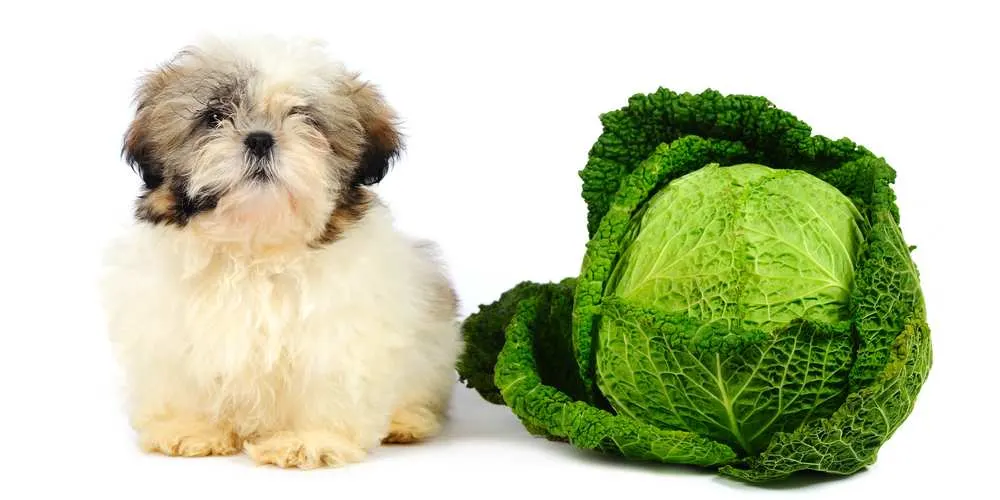
Can Dogs Eat Cabbage?
In short, yes. Dogs can eat cabbage without hesitating. It’s not harmful to dogs, and cabbage is even beneficial to your pet’s health.
The characteristic of a good owner is checking first for every new food you plan to give to your dog. So, good for you! Rest assured, cabbage is perfectly safe for your doggie, but it might result in passing gas! The reaction when eating cabbage is almost entirely the same for dogs and humans.
Green or purple cabbage – it doesn’t matter. Your dog can eat either, just make sure to introduce it according to the guidelines below!
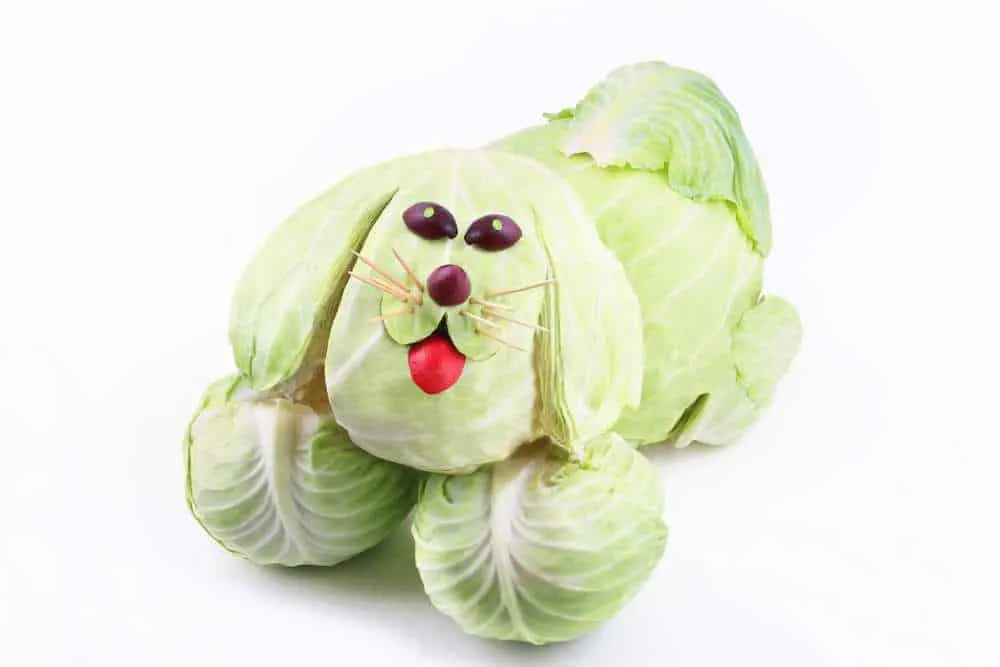
Benefits Of Eating Cabbage
Cabbage is a nutrient-rich food. It boosts levels of antioxidants, fights inflammation, and prevents heart disease.
Let’s see all nutrients that cabbage packs in just 1 cup:
| Calories | 22 |
| Total Carbohydrates | 5.2g |
| Sugar | 2.8g |
| Dietary Fibers | 2.2g |
| Protein | 1.1g |
| Vitamin C | 32.6mg |
| Vitamin K | 67.6mcg |
| Vitamin B6 | 0.1mg |
| Betaine | 0.4mg |
| Folate | 38.3mcg |
| Calcium | 35.6mg |
| Iron | 0.4mg |
| Magnesium | 10.7mg |
For humans, to truly get benefits from fruits and vegetables, you need to eat a lot, all the time. The story is a little different when it comes to dogs – they only need a little to truly get the benefits from it.
Cabbage is a great source of fiber for your pet. It’s also full of antioxidants – and they help your dog stay healthy and vibrant.
This leafy green is full of vitamins, too. Vitamins help your dog fight off disease and infections. A vitamin-rich diet will also make your dog’s fur coat fuller and shinier – you can see how good your pet is feeling!
Additionally, cabbage has a 92% water content. It’s also a great way to keep your canine pet hydrated on hot days!
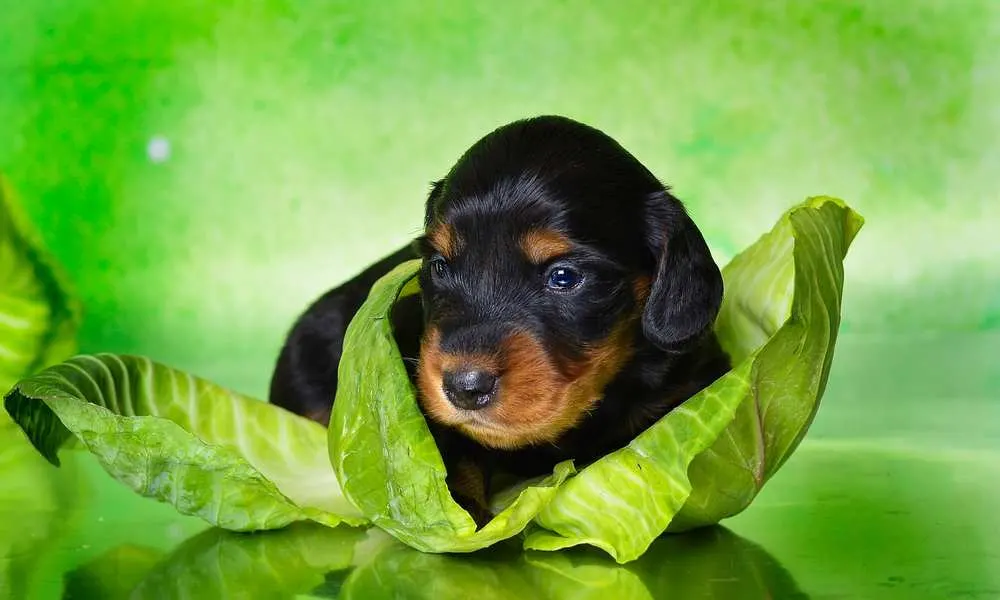
Introducing Cabbage To Your Dog’s Diet
When adding new foods to your dog’s diet, you must do it gradually. Don’t make the entire meal out of the new food. Your pet might be repulsed – and it could result in avoiding that food forever.
It’s important to add a tiny portion of the new food to the usual meal. Each time, add a little more to their meal and watch their behavior afterward just to be safe. Don’t give the dog cabbage prepared for humans – herbs and spices can upset your pet’s stomach and even make it ill.
So, when it comes to cabbage, it has more nutrients cooked, rather than raw. It’s best to boil or cook the cabbage before you serve it to your puppy.
As mentioned, all types of cabbage are fine – green or purple. Green cabbage tends to pack a little more Vitamin C than the purple type, but both are perfectly safe.
Since dogs have a meat-based diet, they do not require a lot of fruits or vegetables to be happy and healthy – a little goes a long way. Watch your dog closely for a few weeks after you start adding cabbage to their food bowl. It will be easy to see that your furry baby is doing much better now!
Raw Or Cooked Cabbage?
If you want your puppy to get the most out of cabbage, it’s important to serve it right. Fresh, raw cabbage is crispy and it might be more appealing to the pet than the cooked variant. However, it’s always better to cook or boil the cabbage. Why so?
Raw cabbage has a high amount of a compound called thiocyanate. Thiocyanate is a natural, organic compound that can affect the thyroid gland. Eating too much raw cabbage on the regular can give your dog hypothyroidism. While cooking, thiocyanate is deactivated and it’s no longer harmful to your doggie. So, remember to always boil the cabbage, and give your pet a small amount.
Chop Or Dice The Cabbage?
Always make sure to chop or dice the cabbage. Chop it to small bits – some dogs, and even yours, tend to munch down on food too fast and end up coughing and spitting.
Also, cabbage will be easier for your dog to digest when it’s already diced. Large pieces or bits can get stuck on the roof of the mouth and upset your pup. So, work that knife a little longer to ensure your pet will have a good time eating cabbage!
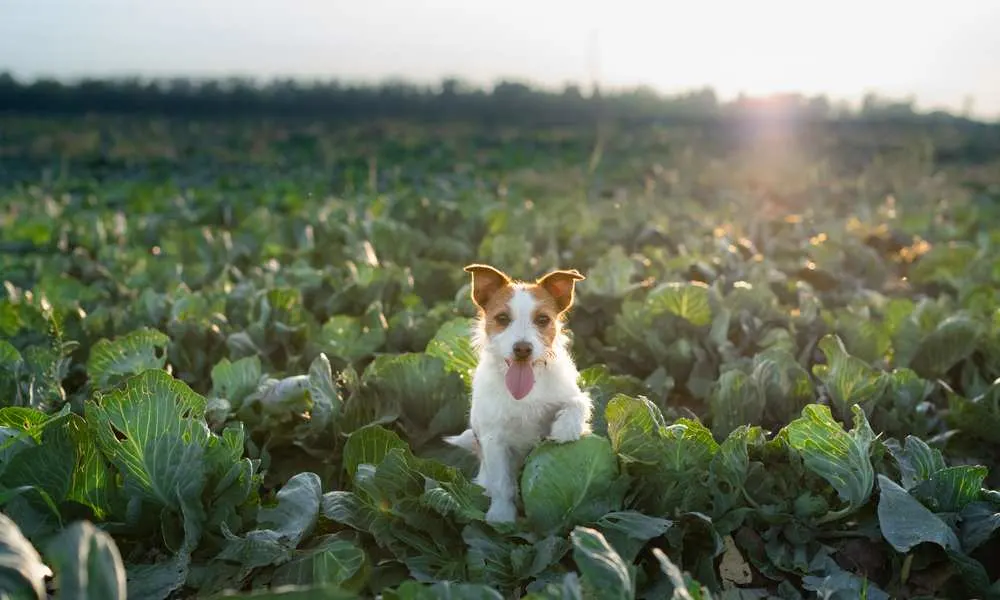
How Much Cabbage Can Your Dog Eat?
When it comes to the serving size for your pup, remember that the cabbage should be a side dish and not the entree. So, sprinkling or adding it to regular meals is the ideal way.
The serving size depends on the size of your dog (obviously). Smaller dogs should have a tiny amount – a quarter or half a leaf will do it. Big dogs can eat a full leaf to get enough nutrients from cabbage.
The cabbage is beneficial to your dog in the following ways:
| Protects from heart disease | Cabbage has a lot of vitamin C, which is important for heart health |
| Good for skin and fur | Vitamin-rich foods make the skin and fur look radiant |
| Fights cancer | Vitamin C is proved to help prevent some types of cancer |
| Aids digestion | Cabbage is rich in fiber, which is important for regular digestion |
| Boosts the immune system | Antioxidants in cabbage keep your puppy safe from various illnesses |
When serving cabbage to your dog, don’t do it too frequently. There is really no need for your pet to eat cabbage on the regular – it gets enough vitamins and other nutrients when eating it once in a while.
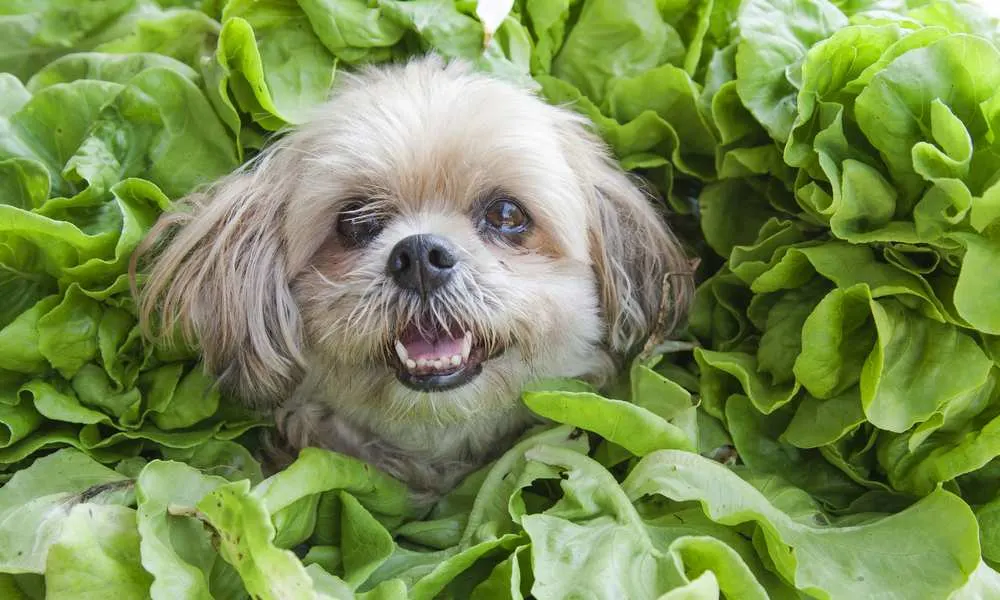
If The Dog Eats Too Much Cabbage
Maybe you’ve left a cabbage salad out or someone else in the family did. Sure enough, your dog couldn’t resist and ate a lot. You know the dog can eat a little, but what can happen when it eats too much?
Usually, the worst thing that can happen is that cabbage can cause flatulence. In other words, a lot of cabbage can result in your dog passing gas. It can be unpleasant for your nose, but the dog will be fine.
Watch out for abnormalities. The cabbage can result in an upset stomach and even watery stool. If that happens, stop giving the dog cabbage. Since dogs are mostly carnivores, they cannot digest plants the way humans do.
If you are worried about the dog after it ate cabbage, watch it closely. If it behaves unusually, a trip to the veterinarian will give you peace of mind. Also, check out our article to find out can dog eat asparagus.
Furthermore, dogs can develop food allergies, just like humans! It’s important to watch it closely after it eats a new food – food allergies can put your dog in serious danger!
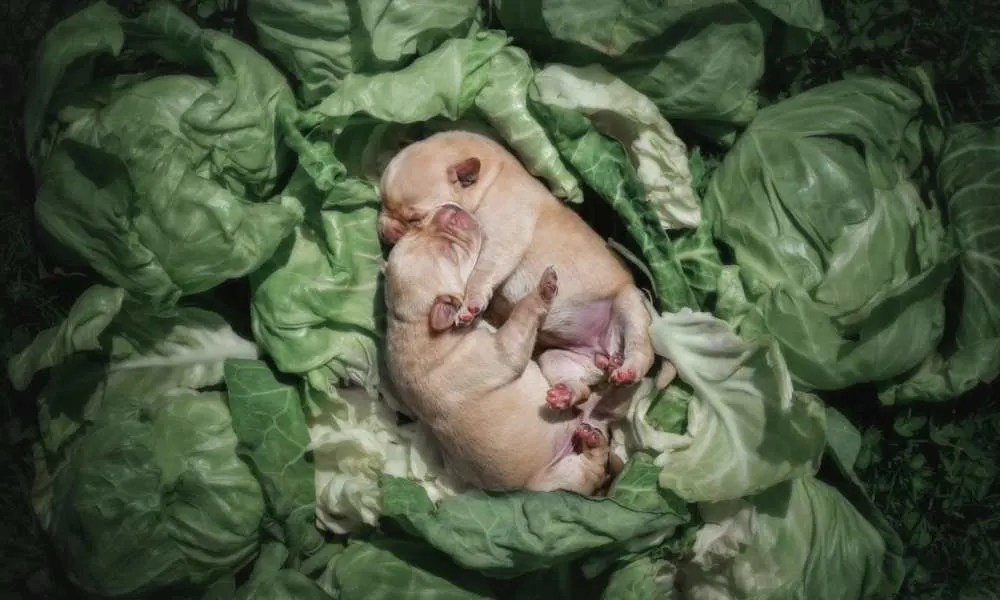
Conclusion
Cabbage is considered a superfood for humans. For dogs, it’s quite beneficial too – it helps your dog stay healthy. Vitamin C found in cabbage fights off cancer and heart disease.
An occasional sprinkle of cabbage in your dog’s diet will make their fur shine! It doesn’t take much to literally see the benefits of cabbage to your pet’s health!
It’s always a better idea to cook the cabbage rather than serve it raw to your pet. Remember to add a modest amount of cabbage – too much cabbage can give your dog flatulence.
It’s a general rule of thumb to watch the dog after introducing a new food. If the food doesn’t sit right for your dog, discontinue use. If the dog seems to love cabbage, add it to meals from time to time – your dog’s health will thank you!
Learn More: What Can Dogs Eat? A Comprehensive List Of Dog-safe Foods

